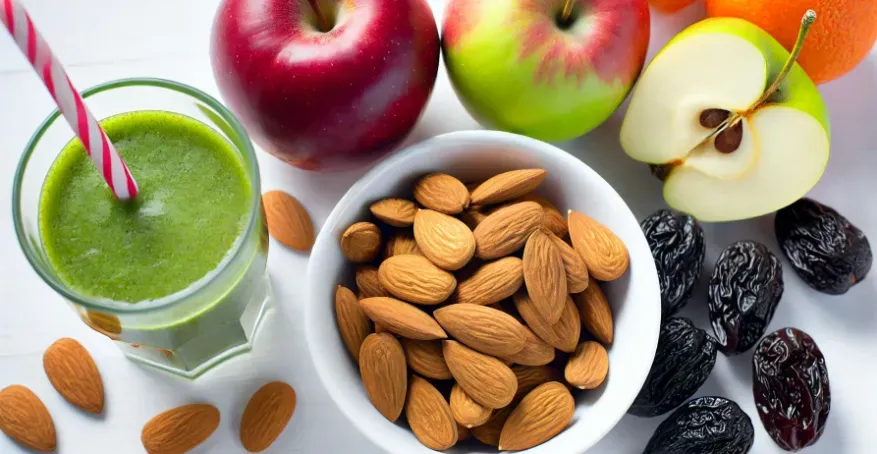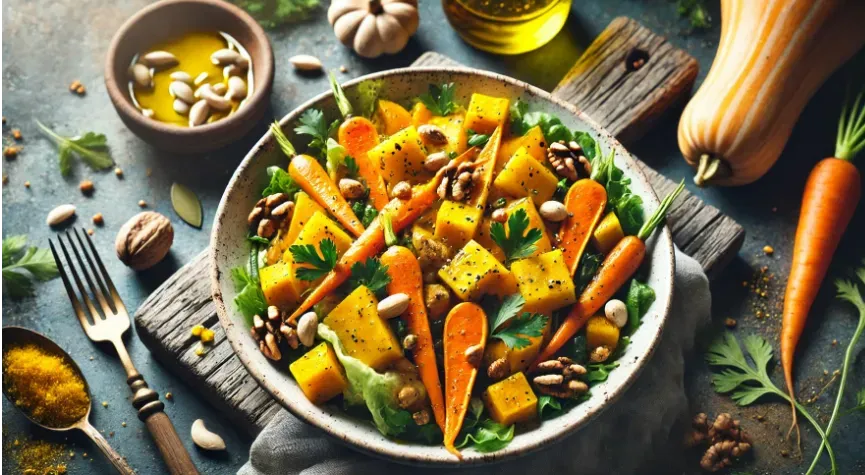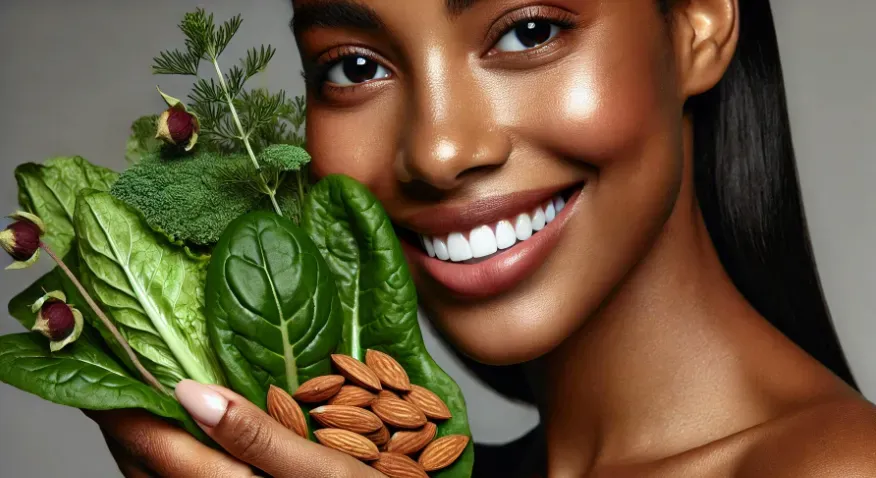How to Naturally Reduce Wrinkles with Food: The Science Behind a Youthful Diet
Introduction to Diet and Skin Health
Diet plays a pivotal role in overall health, including skin health. As we age, our skin shows signs of aging such as wrinkles, and it turns out that what we eat can either accelerate or decelerate this process. Foods rich in certain nutrients can help protect and rejuvenate the skin, making us look younger and feel healthier. One surprising group of foods that show promising benefits are nuts, particularly almonds.
Randomized controlled trials have demonstrated that almond consumption can significantly reduce facial wrinkles. But it's not just about nuts; a broad spectrum of healthy foods including fruits and vegetables can also contribute to better skin health. Let's delve deeper into the scientific findings and practical tips to naturally reduce wrinkles through diet.
By exploring these elements, we can understand how the right dietary choices can lead to healthier, more youthful skin, and overall well-being. The scientific studies backing these claims provide a solid foundation for integrating these foods into our daily lives.
The Surprising Benefits of Nuts
Randomized Controlled Trials on Almonds
Almonds have been the focus of several fascinating studies, showing a direct link between their consumption and reduced wrinkle severity. Researchers conducted trials where participants consumed 2 ounces of almonds daily. This double-blind study revealed that those in the almond group showed significantly decreased wrinkle depth and severity compared to the control group, which consumed nut-free snacks like pretzels or granola bars.

These findings are not just serendipitous. The high content of antioxidants, healthy fats, and vitamins in almonds contribute to better skin health by reducing oxidative stress, a key factor in skin aging. With these results, almonds emerge as a potent natural remedy to keep our skin youthful and radiant.
Key Nutrients in Almonds:
- Vitamin E: Protects skin cells from damage
- Healthy Fats: Maintain skin hydration and elasticity
- Antioxidants: Combat free radicals
Almonds and Wrinkle Severity
The study funded by the Almond Board highlighted that almonds could be a potent ally in the fight against wrinkles. Participants who consumed almonds experienced not just cosmetic benefits but also potential improvements in overall skin health. This was quantified using high-resolution facial photographs and computer-based photographic analysis to measure wrinkle depth and severity.
What makes almonds so special? It’s their robust profile of nutrients, including vitamin E, which is known for its skin-protective properties. Eating just two handfuls of almonds daily could offer not just skin benefits but also improve heart health, making them a wise addition to your diet for multiple reasons.
Incorporating almonds into your daily routine can be easy and versatile. Whether you add them to your morning oatmeal, snack on them throughout the day, or blend them into a smoothie, the options are endless. The key is consistency, as regular consumption is what brings about the best results.
Key Foods That Help Reduce Wrinkles
The Role of Yellow Vegetables
Yellow vegetables like carrots, pumpkins, and sweet potatoes are rich in beta-carotene, an antioxidant that the body converts into vitamin A. Studies have shown that these vegetables can protect the skin against aging and may reduce the appearance of wrinkles. The carotenoids in these veggies help in scavenging harmful free radicals, thereby reducing oxidative stress.
Moreover, population studies have found that people who consume diets rich in yellow vegetables tend to have fewer wrinkles and healthier skin. It’s believed that the vitamins and nutrients in these vegetables help support collagen production and skin repair, critical factors in maintaining youthful skin.
Benefits of Yellow Vegetables:
- Protect against sun damage
- Support collagen production
- Reduce oxidative stress

Studies Highlighting Yellow Vegetables
Recent research has confirmed that a diet high in yellow vegetables is linked to better skin health. These vegetables contain compounds that protect against sun damage, one of the leading causes of skin aging. For example, beta-carotene acts as a natural sunblock, providing internal protection against UV rays.
Incorporating yellow vegetables into your daily meals can be simple and delicious. Whether it’s adding roasted sweet potatoes to your dinner or having a carrot-based smoothie, these vibrant vegetables can make a significant difference in your skin’s appearance over time.
Examples of Yellow Vegetables:
- Carrots
- Pumpkins
- Sweet Potatoes
- Yellow Peppers
The Impact of Fruits and Vegetables
Specific Fruits for Skin Health
Fruits like prunes and apples have been shown to offer remarkable benefits for the skin. Prunes are high in antioxidants, which combat free radicals responsible for aging skin. Studies indicate that regular consumption of prunes can lead to fewer wrinkles and a more even skin tone.
Apples, especially the peel, are rich in vitamins and antioxidants that help maintain skin health. They support collagen production, improving skin elasticity and reducing wrinkle formation. Enjoying these fruits regularly can be a delicious way to nourish your skin from the inside out.
Skin Benefits of Specific Fruits:
- Prunes: High in antioxidants, improve skin tone
- Apples: Support collagen production, improve elasticity
The Protective Role of Beans and Olive Oil
Beans and olive oil are other powerful allies in the fight against wrinkles. Beans are packed with proteins and antioxidants, which are essential for repairing skin tissues and preventing oxidative damage. They also provide a steady source of energy, maintaining skin hydration and elasticity.
Olive oil, often hailed as a superfood, contains monounsaturated fats and vitamins E and K, which are beneficial for skin health. Regular consumption of olive oil has been linked to fewer signs of aging and better skin hydration. Incorporating these foods into your diet can help you achieve smoother, younger-looking skin naturally.
Benefits of Beans and Olive Oil:
- Beans: Rich in proteins and antioxidants, support skin repair
- Olive Oil: Contains monounsaturated fats, improves hydration
Understanding the Mechanisms
Antioxidants and Oxidative Stress Reduction
Antioxidants are crucial for combating oxidative stress, a major factor in skin aging. Foods rich in antioxidants like berries, nuts, and leafy greens neutralize free radicals that damage skin cells. This not only slows down the aging process but also improves overall skin health.
The reduction in oxidative stress translates to fewer wrinkles and better skin texture. By incorporating antioxidant-rich foods into your diet, you can protect your skin from the inside out. This simple dietary adjustment can have profound effects on your appearance and confidence.
Sources of Antioxidants:
- Berries
- Nuts
- Leafy Greens
Benefits of Antioxidants in Foods
Antioxidant-rich foods offer more than just wrinkle reduction. They also enhance skin’s resilience against environmental damage, such as pollution and UV radiation. For instance, vitamin C found in citrus fruits and bell peppers plays a vital role in collagen synthesis, improving skin firmness and elasticity.
Consuming a variety of antioxidant-rich foods ensures that your skin gets a broad spectrum of nutrients. This holistic approach not only targets wrinkles but also promotes a healthy, glowing complexion. Making these foods a staple in your diet can lead to long-lasting skin benefits.
Additional Benefits of Antioxidants:
- Protect against environmental damage
- Improve skin firmness and elasticity
Anti-Inflammatory Benefits
Inflammation is another significant contributor to skin aging. Chronic inflammation can accelerate wrinkle formation and degrade skin quality. Foods like fatty fish, nuts, and leafy greens have anti-inflammatory properties that can mitigate these effects, promoting healthier skin.
The omega-3 fatty acids found in fish such as salmon and mackerel are particularly effective in reducing inflammation. These healthy fats help to maintain the skin’s moisture barrier, keeping it hydrated and supple. Including anti-inflammatory foods in your diet can be a game-changer for your skin health.
Anti-Inflammatory Foods:
- Fatty Fish (Salmon, Mackerel)
- Nuts
- Leafy Greens
Collagen Production and DNA Repair
Collagen is a protein that provides structure to the skin, keeping it firm and youthful. As we age, collagen production declines, leading to wrinkles and sagging skin. Certain foods like bone broth, fish, and citrus fruits can boost collagen production, helping to maintain skin elasticity.
Additionally, nutrients like vitamin C and amino acids play a crucial role in DNA repair, which is essential for healthy skin regeneration. Eating a diet rich in these nutrients can support the body’s natural processes, keeping your skin looking younger for longer.
Foods Supporting Collagen Production and DNA Repair:
- Bone Broth
- Fish
- Citrus Fruits
Practical Dietary Advice
Daily Almond Intake Recommendations
Given the robust evidence supporting the benefits of almonds, incorporating them into your daily diet can be both simple and effective. A study showed that consuming just 2 ounces of almonds per day significantly reduced wrinkle severity. This equates to about two handfuls or approximately 23 almonds.
If the higher dose seems daunting, even a smaller amount can be beneficial. Another study indicated that consuming just 10 grams of almonds daily (around 8 almonds) could improve lipid profiles within six weeks. The key is consistency and making almonds a regular part of your dietary routine.
Recommended Almond Intake:
- High Dose: 2 ounces (23 almonds)
- Low Dose: 10 grams (8 almonds)
Low-Dose vs High-Dose Almond Studies
The distinction between low-dose and high-dose almond consumption is crucial for practical application. While high doses provide quicker and more noticeable results, low-dose consumption is still beneficial for long-term skin health. For those concerned about calorie intake, starting with a smaller amount can still yield positive results.
Both low and high-dose studies highlight the versatility of almonds in promoting not just skin health but also overall well-being. Including almonds in your diet can be a sustainable and enjoyable way to boost your intake of essential nutrients.
Key Findings:
- High Dose: Quicker, noticeable results
- Low Dose: Sustainable, long-term benefits
Incorporating Anti-Wrinkle Foods into Your Diet
Easy Recipes and Snack Ideas
Incorporating anti-wrinkle foods into your diet doesn't have to be complicated. Simple recipes like a mixed berry smoothie, a leafy green salad with olive oil dressing, or a bowl of oatmeal topped with almonds and prunes can be both delicious and nutritious.
Snacking on fruits like apples and carrots or having a handful of nuts like almonds and walnuts can provide your skin with a steady supply of beneficial nutrients throughout the day. These easy and convenient options make it simpler to maintain a diet that supports skin health.
Snack Ideas:
- Mixed Berry Smoothie
- Leafy Green Salad with Olive Oil Dressing
- Oatmeal with Almonds and Prunes
Daily Serving Suggestions
For optimal skin benefits, aim to include a variety of wrinkle-fighting foods in your daily meals. Start your day with a breakfast rich in antioxidants, like a smoothie with berries and spinach. Include a serving of yellow vegetables, beans, or fish in your lunch and dinner.
Snacks should also be nutritious and skin-friendly. Opt for a handful of nuts or a piece of fruit instead of processed snacks. By diversifying your food choices, you ensure that your skin gets a range of nutrients necessary for maintaining its youthful appearance.
Daily Serving Examples:
- Breakfast: Smoothie with Berries and Spinach
- Lunch/Dinner: Yellow Vegetables, Beans, or Fish
- Snacks: Nuts or Fruits
Broader Health Benefits
Chronic Disease Prevention
A diet that promotes skin health also has broader implications for overall well-being. Many of the foods that help reduce wrinkles, such as nuts, fruits, and vegetables, are also linked to lower risks of chronic diseases like heart disease, diabetes, and cancer.
Eating a diet rich in these foods can improve your cardiovascular health, support weight management, and enhance cognitive function. The benefits extend far beyond just a youthful appearance, contributing to a longer and healthier life.
Health Benefits:
- Heart Health: Improved cardiovascular function
- Weight Management: Support for maintaining a healthy weight
- Cognitive Function: Enhanced mental clarity
The Role of a Healthy Diet in Overall Well-being
The connection between diet and overall health is well-documented. Foods that are good for your skin are generally good for your entire body. By prioritizing a diet rich in whole, unprocessed foods, you can enjoy a myriad of health benefits that improve your quality of life.
A healthy diet enhances energy levels, supports immune function, and promotes mental clarity. By making conscious food choices, you can achieve a balanced and nutritious diet that supports both your skin and overall health.
Overall Benefits:
- Enhanced energy levels
- Improved immune function
- Better mental clarity
How Vanity Can Lead to Better Health
Vanity can sometimes be a powerful motivator for adopting healthier habits. The desire to maintain a youthful appearance can lead individuals to make dietary changes that also benefit their overall health. By focusing on foods that reduce wrinkles, you can inadvertently improve your heart health, reduce inflammation, and lower the risk of chronic diseases.
By emphasizing the visible benefits of a healthy diet, such as improved skin, we can encourage more people to make positive dietary changes. This approach can lead to a healthier population, where vanity acts as a catalyst for better health habits.
Motivational Aspects:
- Visible Benefits: Youthful appearance, improved skin
- Health Improvements: Reduced chronic disease risk
Conclusion
Summarizing the Benefits of a Healthy Diet for Skin and Overall Health
In summary, a diet rich in fruits, vegetables, nuts, and other nutrient-dense foods can significantly improve skin health and reduce the appearance of wrinkles. These foods provide essential nutrients that support collagen production, reduce oxidative stress, and enhance DNA repair.
Embracing a healthy diet offers more than just cosmetic benefits. It contributes to overall well-being, reducing the risk of chronic diseases and improving quality of life. By making small, sustainable changes to your diet, you can achieve both radiant skin and robust health.
Key Takeaways:
- Collagen Production: Support skin structure
- Oxidative Stress Reduction: Fewer wrinkles, better skin texture
- Overall Health: Lower risk of chronic diseases
Encouraging Healthier Eating Habits for Both Vanity and Vitality
Encouraging healthier eating habits can be a win-win situation. The desire for youthful skin can drive individuals to adopt a diet that also supports overall health. Simple changes, such as incorporating more almonds, yellow vegetables, and antioxidant-rich foods, can make a significant difference.
By focusing on the visible and tangible benefits of a healthy diet, we can inspire more people to make positive changes. This approach not only enhances individual well-being but also contributes to a healthier, more vibrant society.
Actionable Tips:
- Include Almonds: Daily snack for skin and heart health
- Eat Yellow Vegetables: Support collagen production
- Choose Antioxidant-Rich Foods: Combat oxidative stress
References:
- Foolad N, Vaughn AR, Rybak I, et al. Prospective randomized controlled pilot study on the effects of almond consumption on skin lipids and wrinkles. Phytother Res. 2019;33(12):3212-7.
- Mekić S, Jacobs LC, Hamer MA, et al. A healthy diet in women is associated with less facial wrinkles in a large Dutch population-based cohort. J Am Acad Dermatol. 2019;80(5):1358-63.e2.
- Cosgrove MC, Franco OH, Granger SP, Murray PG, Mayes AE. Dietary nutrient intakes and skin-aging appearance among middle-aged American women. Am J Clin Nutr. 2007;86(4):1225-31.
- Nagata C, Nakamura K, Wada K, et al. Association of dietary fat, vegetables and antioxidant micronutrients with skin ageing in Japanese women. Br J Nutr. 2010;103(10):1493-8.
- Purba MB, Kouris-Blazos A, Wattanapenpaiboon N, et al. Skin wrinkling: can food make a difference? J Am Coll Nutr. 2001;20(1):71-80.
- Jamshed H, Sultan FAT, Iqbal R, Gilani AH. Dietary almonds increase serum hdl cholesterol in coronary artery disease patients in a randomized controlled trial. J Nutr. 2015;145(10):2287-92.

